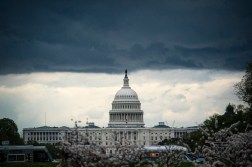Over decade of Washington, D.C., protests, police scanned social media for ‘disrupters’

Over the last ten years, the Metropolitan Police Department in Washington, D.C., has used automated, online surveillance tools to monitor individuals’ social media activity during protected activities, such as protests, and even employed fake social media accounts, according to a report released Tuesday.
The report, which was a collaboration between the Brennan Center for Justice at NYU Law and the Data for Black Lives collective, shared the results of a 2020 Freedom of Information Act request that yielded more than 700,000 pages of internal documents from the Washington police department. The documents showed how MPD police used the online surveillance tools between 2014 and 2021, monitored social media activity, amassed user data and surveilled protest activity though online posts.
City documents acquired through the records request revealed that MPD employed a company called Dataminr, which is an official partner of the social media website X. Dataminr claims to use artificial intelligence to provide its clients real-time alerts about “high-impact events” by monitoring social media posts. According to the Brennan Center report, Dataminr provided MPD with 40 user licenses through a no-cost pilot project in January and February 2017. During that time, the documents showed, MPD used Dataminr software to search for terms such as “riots” and collected social media data surrounding events including Donald Trump’s presidential inauguration and the Women’s March.
Following the pilot, the documents show, MPD purchased seven annual Dataminr licenses at a cost of almost $48,000 using Homeland Security Grant Program funding. And in 2020, the police department renewed its partnership with Dataminr, this time purchasing 50 licenses. The District’s Office of the Chief Technology Officer, which handled procurement of the licenses, paid about $200,000 for the 50 licenses and provided 45 of them to the District’s Homeland Security and Emergency Management Agency.
In an email dated May 29, 2020, OCTO’s then-chief data officer, Barney Krucoff, wrote that access to Dataminr “would be very handy” in the event that large-scale protests — like those in Minneapolis after George Floyd’s murder — were to occur in Washington, D.C.
Another vendor used by District police, called Voyager, claims it can run keyword searches on social media platforms and identify activists or “disrupters,” and then tap into their networks to glean information about their personal relationships and interests. The tool uses fake accounts to gain access to information that it uses to construct reports of users’ social media activity. That activity includes information about user posts and locations.
Ivey Dyson, counsel with the Brennan Center’s Liberty and National Security Program, told StateScoop that the project was inspired by work from the American Civil Liberties Union of Northern California, which in 2016 discovered through FOIA requests that state law enforcement agencies were monitoring social media activity. Dyson said the Brennan Center submitted its own FOIA requests to several police departments for similar information, including in Baltimore, Boston, Los Angeles and New York City.
“Something that’s concerning about that is the fact that online relationships might not translate to in person relationships,” Dyson told StateScoop about Voyager’s technology. “And so while these might be accurate about online activity, it’s not really — if Voyager can do what it says it can do — online activity does not necessarily reflect real-life relationships. And so how useful that information is to law enforcement is questionable.”
Initially, MPD produced only a handful of documents, and in response, the Brennan Center and Data for Black Lives, represented pro bono by Ballard Spahr LLP, in March 2022 sued the city for the remainder of the documents, which included procurement records and emails exchanged among the department, the city’s Office of the Chief Technology Officer and several private software vendors that collect and analyze social media activity.
Dyson said the social media vendors used by the District police department, which purport to collect massive amounts of data, often do so against the social media platforms’ terms and conditions agreements. Last year, Meta — the parent company of Facebook and Instagram — sued Voyager for scraping user data with dummy accounts.
“These tools specifically are unable to understand context, and so what might be an innocent post could then get taken by law enforcement and interpreted into something that is seen as threatening. And this can result in real-life, human-police interactions,” Dyson said. “As we know, those interactions — specifically for communities of color — can be quite harmful, even deadly.”
Dyson said that to avoid chilling free speech and First Amendment-protected activities such as protesting, it’s important for law enforcement agencies to be transparent about their technology policies. That advisement is a key part of the Brennan Center’s social media use policies for law enforcement, a rubric of best practices that also takes into account the risks of automated social media monitoring software.
“I think what’s unique about Washington, D.C., is that it’s a place that hosts hundreds of protests every year,” Dyson said. “It’s a place where important decisions are being made that affect people nationwide. And so there should be strong protections in Washington, D.C., to prevent unwarranted scrutiny of protected speech online.”
Neither the Metropolitan Police Department nor the Office of the Chief Technology Officer responded to requests for comment.
Editor’s note: Scoop News Group has previously consulted with Ballard Spahr’s Media and Entertainment Law practice.






